Fragments and Voices
This is full of fragments and voice, good-natured complaining and so much more.
It’s hot in England and it’s really hot in houses that have several floors for the heat to rise up to. In my house, the bedrooms are on the top floor. I thought I was accustomed to hot weather, but in Texas, where it can be months of consecutive 110F days in the summer, we have air conditioning. I went from my air conditioned home to my air conditioned car to my air conditioned destination. In between all that AC hopping, I could always cool off in my swimming pool.
Rocky and Gingerman are also taken aback by the UK heat, stuck in their fur coats and rendered sprawling and lazy. Rocky slept in front of the one fan I have last night.
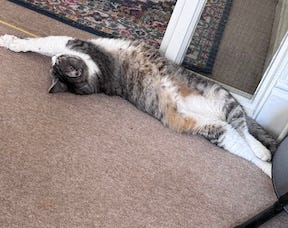
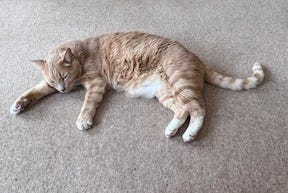
Sweltering here isn’t comfortable, but other than that, I love it. I’m officially a Londoner and life has improved dramatically. Not that there was anything really wrong before, but now that I’ve moved it’s more apparent what was missing. The strands of community starting to weave through this new KV/UK v.2 life have made the prior year + months a stark contrast of alone-ness and isolation. I did cope, but things like spontaneous three hour dinners filled with conversation and laughter with newfound friends were not part of the deal.
There’s one other thing I can complain good naturedly about ( I think complaining good-naturedly is a very ok thing to do. Humorless whining and moaning is not)
In my new house, on the ground floor, there is a room with bi-folding doors which can be pushed open to a walled box of a garden area. The garden needs a lot of work, which I accomplish in fits and starts. This room is technically the dining room as it’s adjacent to the kitchen. It has wood floors and nice light, and I decided on the day I moved in that I would put my desk in here, get a desktop computer, and write a book in this very room.
When I wrote my first book, I designated a writing space by the kitchen, trading the breakfast table for a desk. In 2018, we moved and I did the same at the next house, putting a desk in the breakfast nook where I completed the third and final draft. Here in England, it seems I have created a pattern, or maybe have just fallen into the happy coincidence of a great writing room next to the kitchen. Cats are part of the deal.
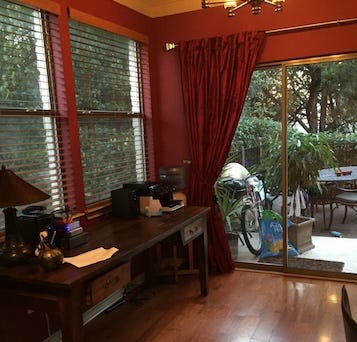
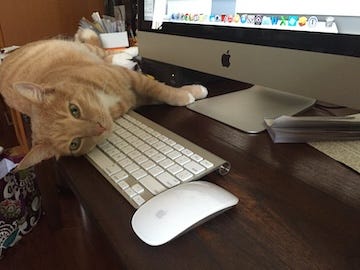
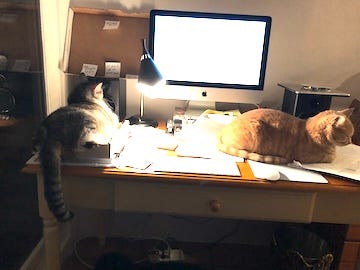
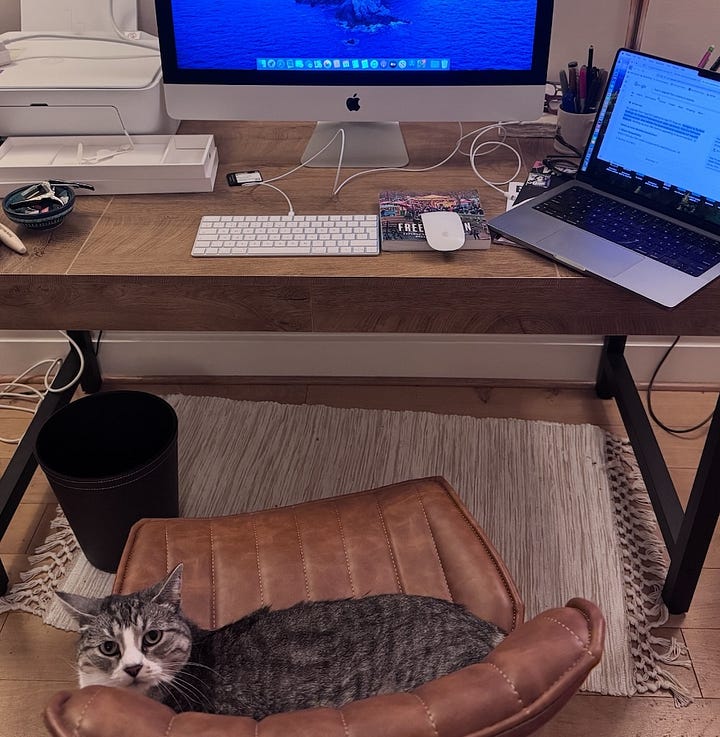
The unexpected complainable thing is a baby expressing itself continually through the open windows and doors of the mystery home on the other side of my tall garden walls. These sounds are without consonants; long owhwwwws and oaahhhs punctuated by occasional shreiks. Most of the time it doesn’t sound either happy or unhappy—it just sounds. Loudly. As bad as this is, it’s worse when the baby is crying. It can cry a very long time. This is the sort of intrusive thing one doesn’t even consider until after you move in and find it. Like a rotten Easter egg.
This baby—complaining loudly with zero humor or good nature—is going to dictate when I write.
When I use perspective however, one of the best tools we humans have, right up there with opposable thumbs, I’m aware that being uncomfortably hot and subjected to a neighbor’s screaming baby are micro-dilemmas. Remember—good-natured complaining is allowed.
I talk about the next book too much. I say I have it mapped out in my brain, that I know the themes, the through-lines, that it is relatable. I say I need an outline and a proposal because it will be much easier to write if I know it will be published and why not, as that’s how I got to write my other book. I make a very good case for how great having a book is: one can count on press, book store appearances, hybrid music/book events, speaking opportunities, the possibility of television or film versions.
Talking about the book you’re gonna write and not writing it isn’t a good approach. It’s what separates the wannabes from the “be’s” or the “are’s.” 1
With music, there’s not anything one can count on, no certain paths from the product to activity. You can spend a lot of time and energy making something out of nothing, which is very rewarding as a process, but it doesn’t necessarily lead to anything. I make music knowing that it’s possible only a handful of people will hear my song or record, no matter how good it is. This has been the story of my music career outside of the Go-Go’s, which is fine—I’m a songwriter and musician regardless of the results of that creativity. I would do it no matter what. Many years ago I read Rainer Maria Rilke’s “Letters to a Young Poet” and understood immediately the nature of what and why I do when it comes to music.
Pretty sure everyone in the arts is familiar with this text, but if not, here’s the key part:
You ask whether your verses are good. You ask me. You have asked others before. You send them to magazines. You compare them with other poems, and you are disturbed when certain editors reject your efforts. Now (since you have allowed me to advise you) I beg you to give up all that. You are looking outward, and that above all you should not do now.
This above all—ask yourself in the stillest hour of your night: must I write? Delve into yourself for a deep answer…
And if this should be affirmative, if you may meet this earnest question with a strong and simple, "I must," then build your life according to this necessity; your life even into its most indifferent and slightest hour must be a sign of this urge and a testimony to it.
If you are not sure, you are not called. That may seem harsh, but the reality of the arts requires that we follow our calling no matter what others think, or even what we believe ourselves. When art is simply what we must do to stay true to ourselves, it is a calling.
And if out of this turning inward, out of this absorption into your own world, verses come, then it will not occur to you to ask anyone whether they are good verses. Nor will you try to interest magazines in your poems: for you will see in them your fond natural possession, a fragment and a voice of your life.
It’s a daunting, and challenging take that Rilke is suggesting here, and arguable as well. There’s been plenty of one hit wonders across the board; people who didn’t “have to” do it, ie, have the calling—yet still produced a work of meritorious genius.
Most people think the takeaway sentiment is the “if you must do it, you are an artist” line, but the part that gets to me is ”for you will see in them…a fragment and voice of your life.”
Words, music, art, performances—they stay long after our bodies have retired into dust and our spirit/soul/essence/energy moves on to whatever form it takes next.
This summer is going to be about balance: putting in the time to conjure my life’s fragments and voice. Making the time to develop friends and relationships. Taking the time to tend to myself physically, see the doc, see the dentist, eat well, exercise. All this is slotted in between deliveries and furniture building and handyman help and buying all the things one needs in a house, and all of it is harder without order and feeling settled.
All of it is harder while still grieving. The other big focus this summer is Clem’s ongoing needs. This isn’t a chore, and keeps him present for me and it matters for reasons I can’t even articulate. All I can easily convey is that he deserves it, whether he’s alive or gone. We are trying to plan and work on everything from his internment to events honoring him. I have a lot of work to do on reviewing the final draft of his book we were able to complete last fall.
Until there is a collective commiseration of his passing, it’s been like having a big box of grief sitting on a shelf waiting to be unpacked and put away but there’s no place to put it all. A weird emotional parallel to the physical stuff I’ve got sitting around waiting to be dealt with. I know grief isn’t ever really put away, but this lack of closure, due to a myriad of malfunctioning moving parts, has been an obstacle.
The other day I visited St Albans and sat in the park with some of my family. My little 2nd cousin Billy had collected some nice broken tree sticks and I was showing him some basic drum beats with them. Anne, my Aunt, checked her phone and it pushed up a photo like they do sometimes—we were stunned that it was a very old shot of Billy’s mom—my cousin, when she was a little girl—along with her baby sister, my aunt Anne, my grandmother, me...and Clem.
I’d taken him to St Albans to hang out with my family in the summer of 1988 and sent her a scan of the photo several years ago.
If that’s not strange enough, this photo was taken in the same park, near where we were now enjoying a beautiful afternoon. We are sitting in the grass, doing drum beats on the ground with broken sticks and a photo with Clem in the same park 37 years earlier is the one that her phone pushes up.
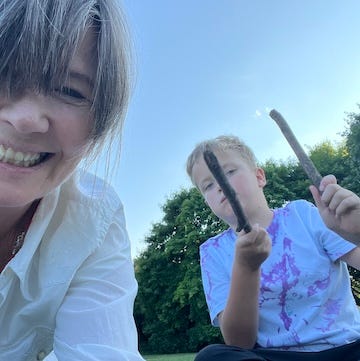
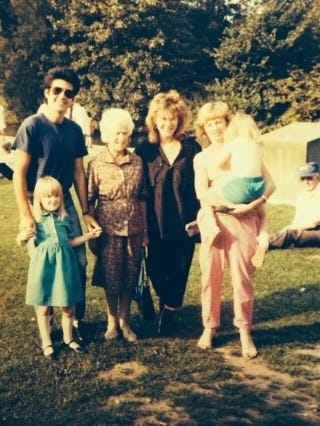
He’s in my thoughts and these little things might happen, things that I try and attach some special meaning to. But the actuality that is so hard to accept is that all I have with him is the past. No more present, no future.
Platitudes don’t help one bit.
IF you’ve read All I Ever Wanted you will know that I became a musician —not a bassist at first, but a musician, a guitar player, a teenaged girl in 1973 who wanted nothing else but to be in a band—after seeing Suzi Quatro on Top of the Pops when I was visiting that same Grandma in the photo above.
Suzi Quatro was as rock star as it gets. She started playing rock n’ roll when she was 14 years old, asking her dad for a bass and starting the Pleasure Seekers with her sisters. In 1964. She was renowned through the UK, Europe and Australia with lots of hit songs, millions of records sold, and non-stop touring—but became known in US primarily as a character on “Happy Days” Leather Tuscadero. This is kind of a drag, in that it’s the role that most Americans associate with Suzi Quatro, when it was really more of a footnote to a massive career.
I’ve met Suzi once, in Austin, at a music convention, and I appeared in “Suzi Q” a 2019 documentary. But last week, after several postpones, I went to her home in the country, an early 16th century manor house, and spent a long afternoon really connecting with the woman who had such an impact on the direction my life took.
At 75 years old, Suzi is still touring most of the time—she was set to leave two days later. We’ve seen blues guys get old and we’re used to country singers and jazz singers of retirement age. But to see rock and roll people getting old? It’s hard for all of us who love and play this music that’s so strongly associated with our youth. I’m grateful to see her working. People like Suzi are not stopping just because they’re older. Shes one of a handful who can normalize rocking and aging for women in their 70’s, which is where I hope to be in the 2030’s. So weird to think about.
We hit it off; it was a solid and wild bookend to my own life in music which began—in my dreams anyway—in England over 50 years ago. Funny old life and world innit?
Next time I will tell you about my interactions with Carol Kaye, an incredible pioneering bassist and guitarist who played on thousands of records—the soundtrack to my youth really, all through the 60’s; TV shows, songs, soundtracks with iconic, genius memorable bass parts.
Yesterday I did a filmed interview for Carol’s upcoming 2025 Rock Hall induction, they will show it as part of the ceremony—and I absolutely respect and admire her talent. In fact I advocated for her inclusion since I got in the Rock Hall in 2021. We’ve not met in person but have had email discussions dating back to 2015. The last and final one was last night.
Let me just leave it at this for now: Carol has not mastered the art of good-natured complaining.
If you got this far…thank you for opening, reading, subscribing, sharing, word of mouthing, commenting, re-stacking, gifting—however you participate in this writer/reader contract we share I am grateful for both your interest, support, and time.
Sometimes one ignores grammar rules for aesthetics. I’m talking the broken rule apostrophes here.

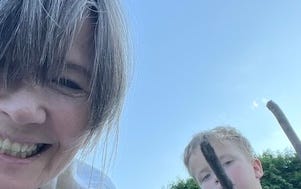






Great to read all this Kathy. Nice to hear about you thriving in life.
You sound happy, Kathy, for the most part anyway and that makes my heart glad.
Being able to complain good-naturedly about the weather is a badge that's awarded when you fully become a Brit. Congratulations and welcome to the club. For the record, they (we now!) spend about four weeks a year complaining about the heat and the other 48 complaining about the cold and/or rain, etcetera. Even if it's not you doing the complaining, one learns to listen - again good-naturedly - and sympathise and perhaps let your mind range elsewhere.
Carol Kaye, whom I know only by her work and reputation, seems to be another of music's elder curmudgeons. Perhaps we can swap lists sometime and ponder how this happens?
Much love, as ever.